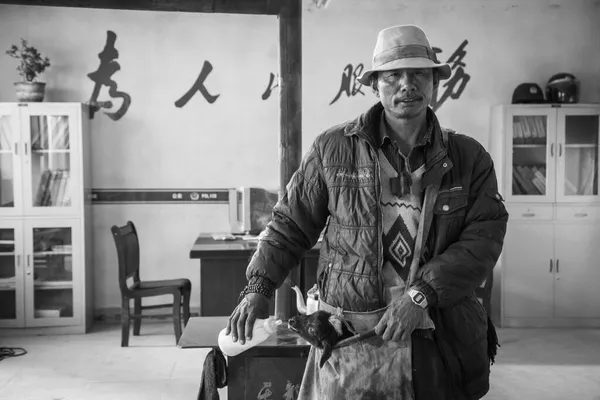 |
| Shide Nyima in Tharlo: 'When I gave the screenplay to him, he was fascinated because it was a challenge for him and the first time that he was going to have this kind of role.' |
Tibetan director Pema Tseden adapted his own novella into Tharlo - the story of a Tibetan shepherd. Shot in black and white, the film looks at Tharlo's identity in crises, a situation sparked by a chance meeting with a young hairdresser who seems to offer the shepherd a way out of his loneliness. We caught up with Tseden after the film's world premiere in the Orrizzonti section at Venice Film Festival (it is also currently online to watch at Sala Web)
 |
| Yangshik Tso and Pema Tseden in Venice for the world premiere of Tharlo Photo: Anne-Sophie Lehec |
PT: The idea came from personal experience. Where I live, in Qinghai [in the north of] Tibet, there are many people like this character. He is over 40 years old, so these people have been through the Cultural Revolution, so when they were young they had to memorise Mao Zedong speeches and other Communist party slogans but actually they didn't understand the stuff - they were just memorising by rote. Now after so many years there is a completely different social environment, these people they can still remember all the slogans and rhetoric from the red book but they are alienated from modern society. So I had the idea to use this sort of person, who is quite common in this area, to represent this alienation.
AW: He almost embraces his own tragedy, he seems to sense the girl may not be such a good girl.
PT: It's more a matter of love and loneliness. Even if he has a feeling that the girl isn't an angel, because of his loneliness and need of a woman, he decides to go back.
AW: The use of the black and white emphasises his isolation as does the way you sometimes shoot at one remove from the character, maybe with him reflected in mirrors.
 |
| Tharlo |
AW: Can we talk about your star Shide Nyima and the fact that you got him to shave off his own, 17-year-old ponytail. Were you always intending to ask him to do that and how did it go?
PT: There is a little story behind this. First, as you know, Nyima is more famous as a comedian, expressing things with his body and more physical performances. So, when I gave the screenplay to him, he was fascinated because it was a challenge for him and the first time that he was going to have this kind of role. And he was impressed because he was surprised to be chosen. Then when I told him, "Do you see you have to shave your hair? Is that okay for you?" He said, "Well, let me think sleep on it and tell you tomorrow." In fact, it was the day after the next day when he called me back and said, "You know what, for art, I can do that."
AW: How important does you think it is to be portraying these sorts of Tibetan problems on screen and is it something you intend to keep exploring?
PT: First of all, it's important because I am Tibetan. And, because most people in the Western world don't know much about the country, I want to tell more about Tibet and the Tibetan people. I particularly want to tell the stories of the lowest class - the most cast off by society. I can use film as an artform to show this, especially to the Western world.
AW: Is it hard to strike a balance in order to avoid Chinese censorship?
PT: Yes, of course, there are censorship problems about making movies in Tibet and about Tibet. But there are topics that you can talk about, and that's what I've done in all my movies. It's a matter of choosing the right subject and then you can still sneak out and talk about Tibet. Although, of course it is a sensitive subject and you can't freely talk about everything that is happening in Tibet.
Read our interview with Yangshik Tso.
Tharlo is out in the UK now.
Watch the trailer:
























